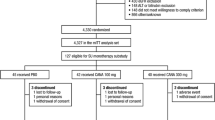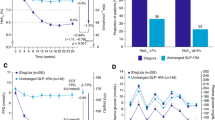Abstract
Objective: To compare the efficacy and safety of repaglinide, a novel oral prandial glucose regulator, with that of glibenclamide, an oral hypoglycaemic agent, in the treatment of patients with type 2 diabetes.
Methods: This was a 14-week, double-blind, parallel-group trail in which a total of 195 type 2 diabetic patients treated with oral hypoglycaemic agents were randomized to receive either repaglinide, administered preprandially three times daily, or glibenclamide, given preprandially once or twice daily, as per manufacturer's recommendations.
Results: By the end of the study, the 2-h postprandial blood glucose values were lower in the repaglinide group than in the glibenclamide group, with the difference approaching statistical significance (repaglinide, 8.1 (0.6) mol · 1−1 vs glibenclamide, 9.1 (0.6) mmol · 1−1; P = 0.07). There was no statistically significant difference in the mean blood glucose level at the end of the study between the two groups (repaglinide, 7.1 (0.5) mmol · 1−1 vs glibenclamide, 7.4 (0.5) mmol·1−1; P = 0.42), and baseline HbA1C values had decreased to the same degree in both the repaglinide [7.8% (0.1%) to 7.5% 0.1%)] and the glibenclamide groups [8.0 (0.1%) to 7.6 (0.1%)]. There are no significant differences between the repaglinide and glibenclamide treatment groups in the levels of fasting blood glucose, fructosamine, fasting C-peptide, insulin and proinsulin. Neither treatment group showed any clinically significant changes in blood lipid profiles. Repaglinide and glibenclamide were both well tolerated. No significant differences were observed between the two treatment groups with respect to adverse events, including hypoglycaemic episodes and weight change. No accumulation of repaglinide was apparent during the maintenance period.
Conclusion: Repaglinide is as well tolerated as glibenclamide and is equally effective in the management of type 2 diabetes. Repaglinide may, however, offer an improvement in postprandial blood glucose control compared with glibenclamide, thereby helping to reduce the relative long-term risk of diabetic complications.
Similar content being viewed by others
Author information
Authors and Affiliations
Additional information
Received: 14 January 1998 / Accepted in revised form: 3 December 1998
Rights and permissions
About this article
Cite this article
Landgraf, R., Bilo, H. & Müller, P. A comparison of repaglinide and glibenclamide in the treatment of type 2 diabetic patients previously treated with sulphonylureas. E J Clin Pharmacol 55, 165–171 (1999). https://doi.org/10.1007/s002280050613
Issue Date:
DOI: https://doi.org/10.1007/s002280050613




